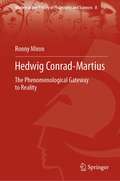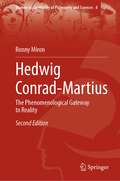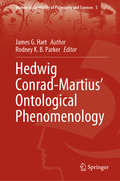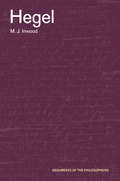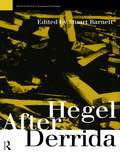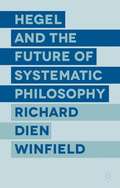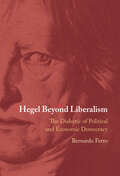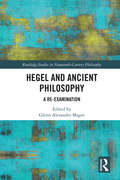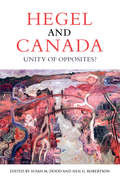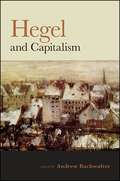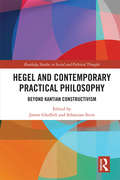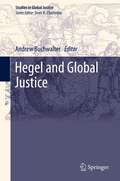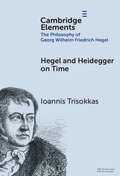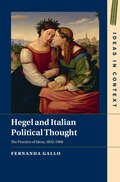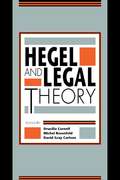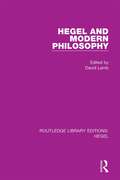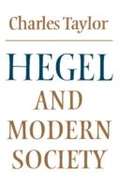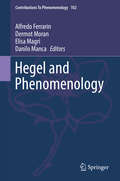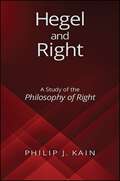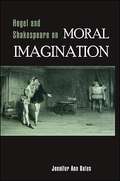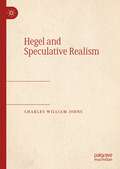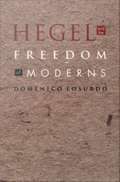- Table View
- List View
Hedwig Conrad-Martius: The Phenomenological Gateway to Reality (Women in the History of Philosophy and Sciences #8)
by Ronny MironThis volume, the first of its kind written in English, interprets the realistic-phenomenological philosophy of Hedwig Conrad-Martius (1888-1966). She was a prominent figure in the Munich-Göttingen Circle, the first generation of phenomenology after Edmund Husserl (1859-1938), and was known as the “first lady of German philosophy”. The articles included in this collection deal with the two main themes constituting her realistic-metaphysical phenomenology: Being and the I. In addition, the collection includes a comprehensive Preface that describes the personal background and the social and philosophical contexts behind Conrad-Martius’s thought, with an emphasis on the mutual influence and fertilization of the group of early phenomenologists in the Munich-Göttingen Circle. The book will be of interest to scholars of philosophy and educated readers.
Hedwig Conrad-Martius: The Phenomenological Gateway to Reality (Women in the History of Philosophy and Sciences #8)
by Ronny MironThis volume, the first of its kind written in English, interprets the realistic-phenomenological philosophy of Hedwig Conrad-Martius (1888-1966). She was a prominent figure in the Munich-Göttingen Circle, the first generation of phenomenology after Edmund Husserl (1859-1938), and was known as the “first lady of German philosophy”.The articles included in this collection deal with the two main themes constituting her realistic-metaphysical phenomenology: Being and the I. The new edition includes an additional chapter opening a new path into the study of Conrad-Martius with Heidegger. In addition, the collection includes a comprehensive Introduction that describes the personal background and the social and philosophical contexts behind Conrad-Martius’s thought, with an emphasis on the mutual influence and fertilization of the group of early phenomenologists in the Munich-Göttingen Circle. The book is aimed at scholars of philosophy and educated readers.
Hedwig Conrad-Martius’ Ontological Phenomenology (Women in the History of Philosophy and Sciences #5)
by James G. HartThis work is an introduction to the totality of the metaphysical philosophy of nature of Hedwig Conrad-Martius (1888-1966). Her own training and inclination as a realist phenomenologist enables a unique perspective on central issues in modern and contemporary (twentieth century) theoretical biology and physics. Here we find novel theories of, e.g., space and time, as well as development and evolution. This work is thus of interest to anyone studying the history of the phenomenological movement as well as religious cosmology.The philosophical basis for this cosmology is Conrad-Martius’ “realontology” which is a phenomenological account of the essence of appearing reality. The full elaboration of the modes of appearing of what is real enables the unfolding of an analogical theory of “selfness” within the order of nature culminating in an account of the coming to be of humans, for whom there is an essentially distinctive world- and self-manifestation for which she reserves the term “spirit.” Key to her position is the revival of ancient metaphysical themes in new transformed guises, especially potentiality and entelechy.Nature’s status, as a self-actuation of world-constituting essence-entelechies, places Conrad-Martius in the middle of philosophical-theological discussions of, e.g., the hermeneutical mandate of demythologization as well as the nature of evolution. Of special interest is her insistence on both nature’s self-actuating and evolving powers and a robust theory of creation.
Hegel
by Charles TaylorThis is a major and comprehensive study of the philosophy of Hegel, his place in the history of ideas, and his continuing relevance and importance. Professor Taylor relates Hegel to the earlier history of philosophy and, more particularly, to the central intellectual and spiritual issues of his own time. He engages with Hegel sympathetically, on Hegel's own terms and, as the subject demands, in detail. This important book is now reissued with a fresh new cover.
Hegel (Arguments of the Philosophers)
by Michael InwoodIn this clear, critical examination of the ideas of one of the greatest and most influential of modern philosophers, M.J. Inwood makes Hegel's arguments fully accessible. He considers Hegel's system as a whole and examines the wide range of problems that it was designed to solve - metaphysical, epistemological theological and political. He concentrates especially on the logical and metaphysical ideas which underpin the system and which supply the key to understanding much of what is obscure in Hegel's thought. Throughout the book, M.J Inwood reconstructs Hegel's thought by arguing with him. He examines Hegel's arguments and restates his views precisely and clearly. He also conveys the impressive unity of Hegel's system and its links with the thought of such philosophers as Aristotle, Spinoza and Kant.
Hegel After Derrida (Warwick Studies in European Philosophy)
by Stuart BarnettHegel After Derrida provides a much needed insight not only into the importance of Hegel and the importance of Derrida's work on Hegel, but also the very foundations of postmodern and deconstructionist thought. It will be essential reading for all those engaging with the work of Derrida and Hegel today and anyone seeking insight into some of the basic but neglected themes of deconstruction.
Hegel And The Future Of Systematic Philosophy
by Richard Dien WinfieldHegel and the Future of Systematic Philosophy critically rethinks and extends Hegel's project for systematic philosophy without foundations, engaging the most important contemporary debates concerning logic, epistemology, metaphysics, nature, mind, economic justice, political freedom, globalization, and literary theory.
Hegel Beyond Liberalism: The Dialectic of Political and Economic Democracy
by Bernardo FerroHegel's political philosophy has long been associated with some form of social or welfare liberalism. Bernardo Ferro challenges this interpretation and shows how Hegel's work harbours a more ambitious philosophical project, pointing to a different vision of modern society. Ferro argues that Hegel's account of the state should be read not as a complement to the concept of civil society, but as a direct challenge to its underlying logic. He then draws the political and economic conclusions implicit in this line of approach, arguing that the conscious pursuit of the common good which Hegel regards as essential to a rational state is not compatible with either a capitalist production system or a constitutional monarchy: a true dialectical synthesis of the particular interests of individuals and the general interests of society entails nothing less than a comprehensive democratization of the economic and the political spheres, and the need for this transformation holds the key to Hegel's enduring political relevance.
Hegel and Ancient Philosophy: A Re-Examination (Routledge Studies in Nineteenth-Century Philosophy)
by Glenn Alexander MageeHegel’s debts to ancient philosophy are widely acknowledged by scholars, and by the philosopher himself. Roughly half of his Lectures on the History of Philosophy is devoted to ancient philosophy, and throughout his work Hegel frequently frames his positions in relation to the thinkers and movements of antiquity. This volume presents original essays from leading scholars dealing with Hegel’s debts to ancient thinkers, as well as his own, often problematic readings of ancient philosophy. While around half of the chapters discuss Hegel’s treatment of Aristotle—a topic that has long been at the forefront of scholarship—the other half explore his relationship to such ancient figures as Xenophanes, Anaxagoras, Socrates, Plato, Sextus Empiricus, and the Stoics. The essays challenge a number of longstanding scholarly assumptions regarding, for example, Hegel’s denigration of the "mythical," his developmentalist approach to ancient thought, his conception of the state in relation to the Greek polis, his "hermeneutic" of the Platonic dialogues, and his use of Aristotelian concepts in arguments concerning the psyche, the body, and their unity and distinction.
Hegel and Canada: Unity of Opposites?
by Susan Dodd Neil G. RobertsonHegel has had a remarkable, yet largely unremarked, role in Canada's intellectual development. In the last half of the twentieth-century, as Canada was coming to define itself in the wake of World War Two, some of Canada’s most thoughtful scholars turned to the work of G.W.F. Hegel for insight. Hegel and Canada is a collection of essays that analyses the real, but under-recognized, role Hegel has played in the intellectual and political development of Canada. The volume focuses on the generation of Canadian scholars who emerged after World War Two: James Doull, Emil Fackenheim, George Grant, Henry S. Harris, and Charles Taylor. These thinkers offer a uniquely Canadian view of Hegel's writings, and, correspondingly, of possible relations between situated community and rational law. Hegel provided a unique intellectual resource for thinking through the complex and opposing aspects that characterize Canada. The volume brings together key scholars from each of these five schools of Canadian Hegel studies and provides a richly nuanced account of the intellectually significant connection of Hegel and Canada.
Hegel and Capitalism
by Andrew BuchwalterBringing together scholars from varying perspectives, this book examines the value of Hegel's thought for understanding and assessing capitalism, both as encountered by Hegel himself and in forms it takes today. The contributors consider Hegel's complex and multifaceted appraisal of modern market societies, which he understands variously as a condition for a proper account of individual freedom, the framework for a productive account of social interdependency, and the breeding ground for a host of social pathologies concerning individual consumption, labor conditions, and disparities in wealth between the rich and poor. Hegel's ideas about the topic are situated in the context of work by other important thinkers, including Adam Smith, Immanuel Kant, J. G. Fichte, Karl Marx, Max Weber, and Theodor Adorno, along with contemporary social and economic theorists. Demonstrating the value of Hegel's philosophy for addressing issues pertaining to capitalism today, the essays bring insight to contemporary concerns such as resurgent neoliberalism, economic globalization, the subordination of ever more spheres of human life to the logic of economic imperatives, and the adequacy of models of utility maximization for comprehending contemporary market societies.
Hegel and Contemporary Practical Philosophy: Beyond Kantian Constructivism (Routledge Studies in Social and Political Thought)
by Sebastian Stein James GledhillWhile Kantian constructivism has become one of the most influential and systematic schools of thought in analytic moral and political philosophy, Hegelian approaches to practical normativity hold out the promise of building upon Kantian insights into individual self-determination while avoiding their dualistic tendencies. James Gledhill and Sebastian Stein unite distinguished scholars of German idealism and contemporary Anglophone practical philosophy with rising stars in the field, to explore whether Hegelian idealist philosophy can offer the categories that analytic practical philosophy requires to overcome the contradictions that have so far plagued Kantian constructivism. The volume organizes the contributions into three parts. The first of these engages debates in metaethics regarding the relationship between realism and constructivism. The second part sees contributors draw on debates about the nature of political normativity, focusing primarily on the problems of historical contextualism, relativism, and critical reflection. The concluding part considers the application of the Hegelian framework to contemporary debates about specific ethical issues, including multiculturalism, democracy, and human rights. Hegel and Contemporary Practical Philosophy contributes to the on-going debate about the importance of systematic philosophy in the context of practical philosophy, engages with contemporary discussions about the shape of a rational social order, and gauges the timeliness of Hegelian philosophy. This book is a must read for scholars interested in Hegel and in the contemporary tradition of Kantian constructivism in moral and political philosophy.
Hegel and Global Justice
by Andrew BuchwalterHegel and Global Justice details the relevance of the thought of G.W.F. Hegel for the burgeoning academic discussions of the topic of global justice. Against the conventional view that Hegel has little constructive to offer to these discussions, this collection, drawing on the expertise of distinguished Hegel scholars and internationally recognized political and social theorists, explicates the contribution both of Hegel himself and his "dialectical" method to the analysis and understanding of a wide range of topics associated with the concept of global justice, construed very broadly. These topics include universal human rights, cosmopolitanism, and cosmopolitan justice, transnationalism, international law, global interculturality, a global poverty, cosmopolitan citizenship, global governance, a global public sphere, a global ethos, and a global notion of collective self-identity. Attention is also accorded the value of Hegel's account of mutual recognition for analysing themes in global justice, both as regards the politics of recognition at the global level and the conditions for a general account of relations of people and persons under conditions of globalization. In exploring these and related themes, the authors of this book regularly compare Hegel to others who have contributed to the discourse on global justice, including Kant, Marx, Rawls, Habermas, Singer, Pogge, Nussbaum, Appiah, and David Miller.
Hegel and Heidegger on Time (Elements in the Philosophy of Georg Wilhelm Friedrich Hegel)
by Ioannis TrisokkasThis Element discusses Heidegger's early (1924–1931) reading and critique of Hegel, which revolve around the topic of time. The standard view is that Heidegger distances himself from Hegel by arguing that whereas he takes time to be 'originarily' Dasein's 'temporality,' Hegel has a 'vulgar' conception of time as 'now-time' (the succession of formal nows). The Element defends the thesis that while this difference concerning the nature of time is certainly a part of Heidegger's 'confrontation' with Hegel, it is not its kernel. What Heidegger aspired to convey with his Hegel-critique is that they have a divergent conception of man's understanding of being (ontology). Whereas Heidegger takes ontology to be grounded in temporality, Hegel thinks it is grounded in 'the concept,' which has a dimension ('logos') manifesting eternity or timelessness. It is argued, contra Kojève, that Heidegger's reading (but not necessarily his critique) of Hegel is, in an important respect, correct.
Hegel and Italian Political Thought: The Practice of Ideas, 1832–1900 (Ideas in Context)
by Fernanda GalloAcross Italy in the nineteenth century, a generation of intellectuals engaged with Hegel's philosophy while actively participating in Italian political life. Hegel and Italian Political Thought traces the reception and transformation of these ideas, exploring how Hegelian concepts were reworked into political practices by Italians who had participated in the 1848 revolution, who would lead the new Italian State after unification, and who would continue to play a central role in Italian politics until the end of the century. Fernanda Gallo investigates the particular features of Italian Hegelianism, demonstrating how intellectuals insisted on the historical and political dimension of Hegel's idealism. Set apart from the broader European reception, these thinkers presented a critical Hegelianism closer to practice than ideas, to history than metaphysics. This study challenges conventional hierarchies in the study of Italian political thought, exploring how the ideas of Hegel acquired newfound political power when brought into connection with their specific historical context.
Hegel and Legal Theory
by Michel Rosenfeld David Gray Carlson Drucilla CornellThe first collection of essays directed towards jurisprudence with a Hegelian theme. The editors are committed to the idea that Hegel is the future source of great energy and insight within the legal academy.
Hegel and Modern Philosophy
by David LambOriginally published in 1987, this volume reflects the diversity in Hegelianism and every branch of philosophy which he contributed to. It includes essays on his contribution to contemporary social philosophy, logic and the philosophy of religion. His work is examined in relation to Marx, Wittgenstein and his social philosophy discussed from a feminist standpoint.
Hegel and Modern Society
by Charles TaylorDiscussion of Hegel's contributions to philosophy and modernity
Hegel and Phenomenology (Contributions to Phenomenology #102)
by Dermot Moran Alfredo Ferrarin Elisa Magrì Danilo MancaThis volume articulates and develops new research questions and original insights regarding the philosophical dialogue between Hegel’s philosophy, his heritage, and contemporary phenomenology, including, among others, Husserl, Heidegger, Merleau-Ponty, and Ricoeur. The collection discusses methodological questions concerning the relevance of Hegel’s philosophy for contemporary phenomenology, addressing core issues revolving around the key concepts of history, being, science, subjectivity, and dialectic. The volume fills a gap in historiography, expanding the knowledge of the impact of Hegel's philosophy on contemporary philosophy and raising new questions on the transformation of transcendental philosophy in post-Kantian philosophy. The contributions gathered in this volume shed new light on issues related to the problem of scientific method in philosophy, on the philosophy of history, as well as on the dimension of subjectivity. By providing critical insights into Hegel’s philosophy and contemporary phenomenology, the book opens up new research perspectives recommended to philosophers and scholars of different traditions, especially classical German philosophy, phenomenology, and history of Western philosophy.
Hegel and Right: A Study of the Philosophy of Right
by Philip J. KainIn this book, Philip J. Kain introduces Hegel's Philosophy of Right by focusing on disagreements, both with standard interpretations of his work and with Hegel himself. Arguing that Hegel's justification for punishment ultimately fails, Kain shows how this failure brings into focus the inherent difficulties in justifying punishment at all, thus producing a valuable Hegelian argument against punishment. Whereas many of Hegel's critics have argued that he misunderstands Kant's categorical imperative, Kain argues the opposite: that Hegel has a sophisticated understanding of it and simply attempts to provide a broader ethical context for Kant's position. In addressing these and other questions, such as whether Hegel's theory of recognition, properly understood, can provide philosophical support for same-sex marriage, and whether supporting monarchy over democracy means that Hegel seeks less rather than greater power for the state, Kain makes Hegel's work more approachable by drawing out philosophical points of independent importance.
Hegel and Schelling in Early Nineteenth-Century France: Volume 1 - Texts and Materials (International Archives of the History of Ideas Archives internationales d'histoire des idées #246)
by Daniel Whistler Kirill Chepurin Adi Efal-Lautenschläger Ayşe YuvaHegel and Schelling in Early Nineteenth-Century France is a two-volume work that documents the French reception of G. W. F. Hegel and F. W. J. Schelling from 1801 to 1848. It shows that the story of the "French Hegel" didn't begin with Wahl and Kojève by giving readers a solid understanding of the various ways in which German Idealism impacted nineteenth-century French philosophy, as well as providing the first ever English-language translations of excerpts from the most important philosophical texts of the era. Inside volume one, readers will find a number of interpretative frameworks to help them get to grips with this neglected field in the history of ideas. In addition to excerpted translations and a narrative of Hegel’s and Schelling’s fate in France during the early nineteenth century, this volume includes an introduction on transnational reception history, as well as an analytical catalogue of the translations of their work produced in French at this time, of the publications which appropriated or interrogated their philosophical legacy, and of the journals, institutional structures and other mechanisms of dissemination that brought Hegel’s and Schelling’s philosophy into France. The book thus details the ways in which French philosophers of the period took up the debates and concepts of German Idealism, transformed them or rejected them. In this way, it aims to contribute to a reversal of the serious neglect of early nineteenth-century French thought in English-language scholarship and, in so doing, goes beyond a nation-based narrative of the history of philosophy. Figures covered in the volumes include major philosophers such as Cousin, Leroux, Proudhon, Quinet, Ravaisson, Renouvier and Véra, as well as more neglected figures, like Barchou de Penhoën, Bénard, Lèbre, Lerminier, Pictet, and Willm.
Hegel and Schelling in Early Nineteenth-Century France: Volume 2 - Studies (International Archives of the History of Ideas Archives internationales d'histoire des idées #247)
by Daniel Whistler Kirill Chepurin Adi Efal-Lautenschläger Ayşe YuvaHegel and Schelling in Early Nineteenth-Century France is a two-volume work that documents the French reception of G. W. F. Hegel and F. W. J. Schelling from 1801 to 1848. It shows that the story of the "French Hegel" didn't begin with Wahl and Kojève by giving readers a solid understanding of the various ways in which German Idealism impacted nineteenth-century French philosophy, as well as providing the first ever English-language translations of excerpts from the most important philosophical texts of the era. Inside volume two, readers will find a series of scholarly studies to help them get to grips with this neglected field in the history of ideas. The contributors are world-leading and emerging experts from Europe, UK, and North America. They highlight the stakes and trace the pathways of this reception for French and German thought during the period, including the ways in which French philosophers of the period took up the debates and concepts of German Idealism, transformed them or rejected them. In this way, the volume aims to redress the serious neglect of early nineteenth-century French thought in English-language scholarship and, in so doing, goes beyond a nation-based narrative of the history of philosophy. Figures covered in the volumes include major philosophers such as Cousin, Leroux, Proudhon, Quinet, Ravaisson, Renouvier and Véra, as well more neglected figures, like Barchou de Penhoën, Bénard, Lèbre, Lerminier, Pictet, and Willm.
Hegel and Shakespeare on Moral Imagination
by Jennifer Ann BatesIn this fascinating book, Jennifer Ann Bates examines shapes of self-consciousness and their roles in the tricky interface between reality and drama. Shakespeare's plots and characters are used to shed light on Hegelian dialectic, and Hegel's philosophical works on art and politics are used to shed light on Shakespeare's dramas. Bates focuses on moral imagination and on how interpretations of drama and history constrain it. For example: how much luck and necessity drive a character's actions? Would Coriolanus be a better example than Antigone in Hegel's account of the Kinship-State conflict? What disorients us and makes us morally stuck? The sovereign self, the moral pragmatics of wit, and the relationship between law, tragedy, and comedy are among the multifaceted considerations examined in this incisive work. Along the way, Bates traces the development of deleterious concepts such as fate, anti-Aufhebung, crime, evil, and hypocrisy, as well as helpful concepts such as wonder, judgment, forgiveness, and justice
Hegel and Speculative Realism
by Charles William JohnsHegel and Speculative Realism has two main objectives. Firstly, to assess the speculative realist formulations of the real regarding the ‘withdrawn’ object, radical contingency, the absolute register of extinction, and the current interest in ‘powers philosophy’, with special attention to their possible relation to the absolute scope of Hegelian philosophy. Secondly, to invite the reader to reconsider Hegel in a new way; uncovering rare insights into his thoughts on astronomy, actuality, the concrete and non-being. Johns’ inclination is to not mistake the necessary path to the absolute as the only path. Johns argues that Hegel describes the unique trajectory of the dialectical relationship between Nature and Idea as a Spirit oriented by both logical and physical (spatio-temporal) dimensions. Johns reads this as a theory of singularity and makes the bold claim that there may be other paths not taken by the Hegelian spatio-temporal path synonymous with the dialectic; synthesis, sublation and unfolding. In-fact, speculative philosophy should not be satisfied to study only “what exists” but also what “could exist” or what it means to “inexist” and should entertain multiple modes of potential becoming between Hegel’s initial triad of logical categories; Being, Non-Being and Becoming.
Hegel and The Freedom of Moderns
by Domenico LosurdoAvailable in English for the first time, Hegel and the Freedom of Moderns revives discussion of the major political and philosophical tenets underlying contemporary liberalism through a revolutionary interpretation of G. W. F. Hegel's thought. Domenico Losurdo, one of the world's leading Hegelians, reveals that the philosopher was fully engaged with the political controversies of his time. In so doing, he shows how the issues addressed by Hegel in the nineteenth century resonate with many of the central political concerns of today, among them questions of community, nation, liberalism, and freedom. Based on an examination of Hegel's entire corpus--including manuscripts, lecture notes, different versions of texts, and letters--Losurdo locates the philosopher's works within the historical contexts and political situations in which they were composed. Hegel and the Freedom of Moderns persuasively argues that the tug of war between "conservative" and "liberal" interpretations of Hegel has obscured and distorted the most important aspects of his political thought. Losurdo unravels this misleading dualism and provides an illuminating discussion of the relation between Hegel's political philosophy and the thinking of Karl Marx and Friedrich Engels. He also discusses Hegel's ideas in relation to the pertinent writings of other major figures of modern political philosophy such as Jean-Jacques Rousseau, John Locke, Edmund Burke, John Stuart Mill, Jeremy Bentham, Karl Popper, Norberto Bobbio, and Friedrich Hayek.
